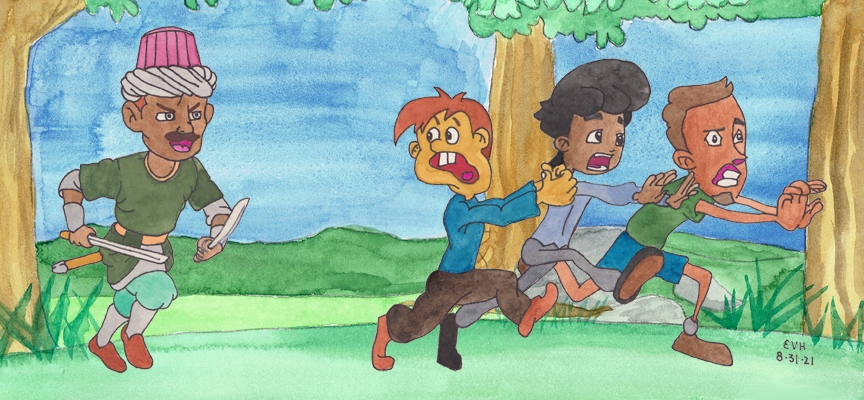
Jataka 265
Khurappa Jātaka
Many Arrows
as told by Eric Van Horn
originally translated by William Henry Denham Rouse, Cambridge University
originally edited by Professor Edward Byles Cowell, Cambridge University
One of the important ways in which Buddhist thinking changes how we behave is through the belief in rebirth and the notion that we have lived an infinite number of lifetimes. What is important is not this one lifetime, but our karma. The purpose of life is to develop good qualities and abandon unwholesome qualities. In this story a forester behaves heroically because he puts his life into this larger context.
“When many a bow.” The Master told this story while he was at Jetavana. It is about a monk who had lost his energy and motivation for the practice. The Master asked if was it true that this monk had lost his energy. “Yes,” he replied. “Why,” the Master asked, “have you slackened in your persistence after embracing this doctrine of awakening? In days gone by wise men were energetic even in matters which do not lead to salvation.” And he told them this story from the past.
Once upon a time when Brahmadatta was the King of Benares, the Bodhisatta was born into the family of a forester. When he grew up he became the leader of a band of 500 foresters, and he lived in a village at the entrance to the forest. There he used to hire himself out to guide men through it.
Now one day a man of Benares, a merchant’s son, arrived at that village with a caravan of 500 wagons. Sending for the Bodhisatta, he offered him a thousand gold coins to be his guide through the forest. He agreed and received the money from the merchant’s hand. And as he took it, because of the merchant’s generosity he mentally devoted his life to the merchant’s service. Then he guided him into the forest.
In the middle of the forest a band of 500 robbers appeared. As soon as the rest of the company saw these robbers they groveled on their bellies. But the head forester—all alone—shouted and leapt and fought, and all 500 robbers fled. The forester then led the merchant safely through the woods. Once through the forest, the merchant encamped his caravan. Then he gave the chief forester choice meats of every kind, and himself having broken his fast, sat pleasantly by him. He said to him, “Tell me how it was that even when 500 robbers, with arms in their hands, were spread all around, you felt not any fear in your heart?” And he uttered the first stanza:
“When many a bow the shaft at speed let fly—
Hands grasping blades of tempered steel were nigh—
When Death had marshalled all his dread array—
Why, amid such terror, felt you no dismay?”

Figure: He felt no dismay!
On hearing this the forester repeated the following two verses:
“When many a bow the shaft at speed let fly—
Hands grasping blades of tempered steel were nigh—
When Death had marshalled all his dread array—
I felt a great and mighty joy this day.
“And this my joy gave me the victory,
I was resolved to die, if need should be.
He must give up his life, who would fulfil
Heroic deeds and be a hero still.”
In this way the forester sent forth his words like a shower of arrows. And having explained how he had performed heroically through being free from the desire to live, he parted from the young merchant and returned to his own village. There he gave alms and did good deeds, and when he passed away he was reborn according to his karma.
When the Master had ended this discourse he taught the Four Noble Truths, at the conclusion of which the disheartened monk became fully enlightened. Then the Master identified the Birth: “At that time I was the chief of the foresters.”
